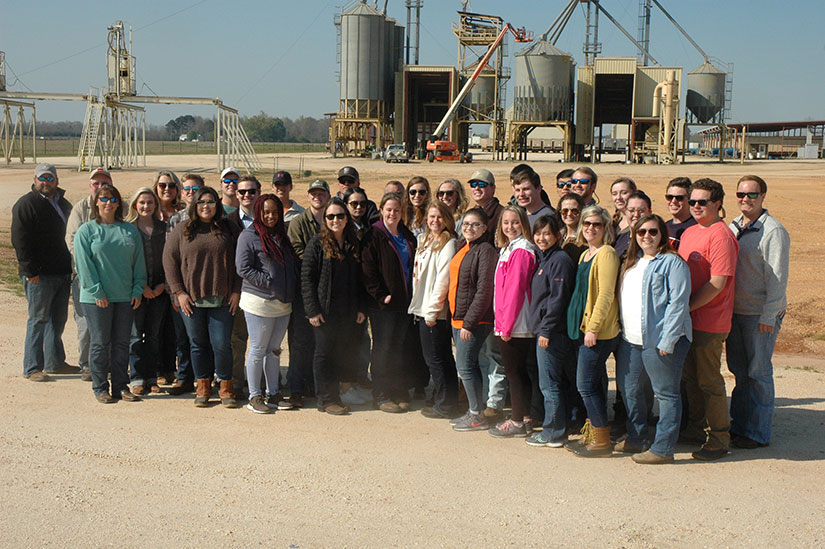
While most of their peers were frolicking on Florida beaches, 28 students from Auburn University’s College of Agriculture spent their spring break on a tour of the state’s diverse farming and farming-related operations.
The group traveled more than 1,200 miles and visited 19 different agri-businesses as part of Alabama Ag Expedition, sponsored by Alabama Wheat and Feed Grain Producers.
Among their stops was Tri-County Peanut’s drying plant, just off Butler Street in rural Escambia County, where Plant Manager Chad Helton, Monroe County’s Scott Saucer, and Atmore’s Sammy Gibbs explained the mill’s operations and answered questions about local agriculture.
Helton provided a step-by-step explanation of the process peanuts undergo once they get to the plant. He also told the students that the local farm economy was “about sixty-forty, cotton and peanuts,” and told how the drying and shelling operation has grown since it opened in 2003.
Debra Davis, Publication Director for Alabama Farmers Federation, said the wheat and feed grain producers wanted to expose the AU students to as many different types of agricultural operations as was possible during the six-day tour.
“They’ve seen everything from harvesting timber to a modern sawmill, from a catfish farm to row crop operations, cattle operations and Alabama Farmers Cooperative, the largest farmers co-op in the state,” Davis said during the March 14 stopover. “This morning they visited the Priester’s Pecans shelling plant and store and Conecuh Sausage Company, and Tri-County is our last stop for today.”
The group’s March 15-16 itinerary included visits to the Port of Mobile, Waters Nursery in Robertsdale, and Ariton poultry operation and Bonnie Plant Farm in Union Springs.
Saucer, who chairs the Alabama Wheat and Feed Grain Committee, explained in answer to a question that irrigation is rarely required in Lower Alabama, where pop-up thundershowers provide enough water for most farming operations.
“The first irrigation rig I saw was built right north of Atmore and it sat seven years before it ever moved,” agreed Gibbs, who is president of Escambia County Farmers Federation.
Carla Hornady, director of AFF’s Wheat and Feed Grains Division, said the trip was organized to help agriculture students understand the diversity of Alabama’s crops and agriculture-related functions.
“There are so many students within the college of agriculture that do not have a farm background, yet they’re interested in agriculture and that’s what their major is,” she said. “So we decided that we would offer this opportunity to kind of show them the diversity of the crops and industry here in Alabama. We wanted to give them a new perspective on agriculture, and a lot of them have said they are getting that.”
Cara Cornutt, an ag-economics major from Boaz, and Jake Patterson of Huntsville, who is majoring in agronomy and soils, agreed that the tour has been eye-opening.
“I’m seeing the diversities in agriculture and seeing stuff I haven’t been able to see in my life,” said Cornutt. “I’m from a family farm, and we only do row crops, so I don’t get to see a catfish farm or a peanut farm or anything like that.”
Patterson said he has gained a new perspective on the range of diverse operations that make up the state’s farm economy.
“I’ve learned a little bit about everything,” he said. “I don’t know a lick about peanuts, so it was really cool to hear that spiel. It’s really cool to see how diverse the state of Alabama truly is, how different it is from east to west and from north to south. It just blows my mind.”
Amy Wright, associate dean for Auburn’s College of Agriculture, pointed out that the group includes a range of students from freshmen to fifth-year seniors who will earn two hours credit. Students had to research each of the locations visited and talk about each one as the bus trip continued.
Wright said the trip has been a learning experience for everyone involved.
“Other departments have had spring break trips in the past, but they’re usually discipline-specific,” she said. “It’s wonderful. My background is in horticulture, so I know about nursery production, but I don’t know about all these other ones. It’s been great for me, too. I hate to say that they are giving up their spring break, because this is a learning experience for them.
“It’s really great for me and some students I wouldn’t normally get to spend a lot of time with, some of our top students. It’s exciting for the college to be able to have this opportunity for our students.”
